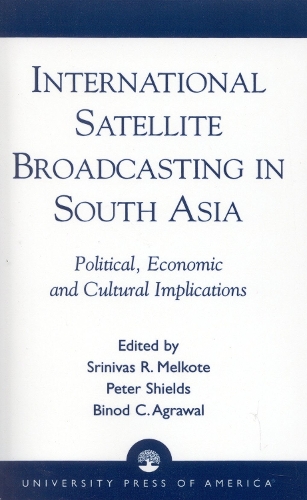
International Satellite Broadcasting in South Asia: Political, Economic and Cultural Implications
(Paperback)
Publishing Details
International Satellite Broadcasting in South Asia: Political, Economic and Cultural Implications
By (Author) Srinivas R. Melkote
Contributions by Ewart C. Skinner
Contributions by Srvinivas R. Melkote
Contributions by Sundeep R. Muppidi
Contributions by Keval J. Kumar
Contributions by Sandhya Rao
Contributions by Geetika Pathania
Contributions by Peter Shields
Contributions by Andrew Woodfield
Contributions by Binod C. Agrawal
University Press of America
University Press of America
20th August 1998
United States
Classifications
Tertiary Education
Non Fiction
302.23450954
Physical Properties
Paperback
342
Width 136mm, Height 217mm, Spine 25mm
440g
Description
International Satellite Broadcasting in South Asia focuses on the increase in the popularity of television in India beginning with the entrance of Hong Kong Based STAR-TV in 1991. This television system, which initially carried mostly Western programs, radically changed the nature of entertainment communications in countries where communications were generally state-controlled. These essays address the political, economic, and cultural significance and impact of transnational satellite networks in India, questioning the cultural effects of Western media programs on the recipient non-Western countries. They contain a survey of STAR-TV and the state-controlled Doordarshan as well as explore issues such as media and identity, pro-social entertainment television and culture as a market force.
Reviews
This small book. . . marks a significant contribution to the literature on international political communication. * Contemporary South Asia *
This small book. . . marks a significant contribution to the literature on international political communication. * Contemporary South Asia *
Author Bio
Srinivas R. Melkote is Professor of Telecommunications at Bowling Green University.
